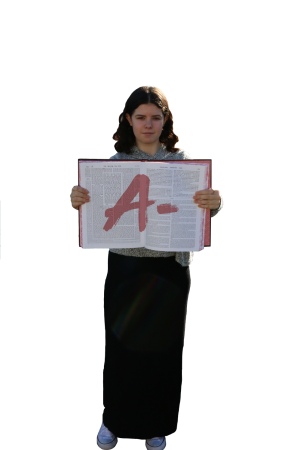TWO BOILING POINTS OF VIEW: Should Judaic classes be graded?
May 11, 2018
Yes, our experience in Judaic classes must be active.
School days at Shalhevet are packed full with learning, tests, and the formidable grading. The pressure to perform well in classes and succeed remains steady throughout high school (barring senioritis.)
Our dual curriculum makes the school day especially long, with less time than other schools to focus on General Studies. Are students responsible or even capable of remaining intrinsically motivated in every class? No. So how can students excel in their studies?
The answer to this problem is simple: grades. We are graded on attendance, participation, and retention, a very compelling system of extrinsic rewards. Grading is a necessary response to human nature, and all classes at Shalhevet, including Judaic ones, should be graded.
The idea that Judaism is an area of study that Shalhevet students must be excited about is actually harmful. Although Shalhevet students are usually bright and engaged, we are still children and should not have the pressure to decide whether or not to go to class. The idea that we should show up to Judaic classes when we have three upcoming tests in General Studies classes insults our ability and desire to prioritize.
It’s true that we attend co-curriculars without the incentive of grades. We do this because we are passionate about them, whether it is choir, sports, Model Congress or the Boiling Point. We are opting into those programs out of personal joy. Judaic Studies are expected of us because of our parents’ values.
Also, if we are attending school to better our knowledge, we must review all learning and make it our own. Knowing we’ll be graded changes the nature of our experience in the class from passive to active. We might complete assignments even if they were not graded, but the time and effort put into them would diminish and so would our ownership of the material.
In addition, sometimes our extrinsic motivations have a positive outcome. When we are inclined to push ourselves into Honors Judaic classes, or work harder to receive good grades, we might start out doing so for a GPA boost, but end up with a rich background and excitement for a topic previously found unengaging.
Doing something right for the wrong reasons is still desirable. In the case of Judaic Studies, perhaps it can even change the trajectory of a person’s life towards greater engagement in Judaism.
It is not surprising that only a handful of students come to Shalhevet with an intrinsic joy in Torah learning. The same is true of most subjects; some would take math all day, others history or art. Judaic Studies likewise cannot be the inherent interest of everyone.
For students who do have a natural passion for Judaic classes, there are many options at Shalhevet, including some that are not graded. There’s an after-school Judaic learning program called Beit Midrash Chabura and an early-morning program with Rabbi Lieberman, and a Sunday morning learning program where parents learn with their children. AGS Talmud class meets for two extra hours a week during breakfast.
Except for AGS Talmud, none of these are graded because they are extracurricular activities for students who find joy in Judaic learning. They give Shalhevet students a place without grading pressure to learn Torah for its own sake — l’shma — which all agree is desirable .
Some Judaic teachers grade differently than General Studies teachers do, to alleviate some of the pressure of succeeding in their class. Dr. Weissman gives A’s, B’s, and “Not Yet’s,” the Not Yet grade meaning that the student must make up the assignment for a better grade. A more lenient grading system still retains the benefits of grading, holding us accountable for our success in the classroom.
Some argue that it’s impossible or wrong to grade a person’s connection to God or desire for Torah learning, but that is not what Judaic classes are basing their grades on. No matter their level of interest, all students are graded on their attendance and graded assignments, as in any class.
In addition, Judaic Studies, unlike davening, is not necessarily a religious experience. Talmud classes are offered in many universities and are studied by Jews and non-Jews alike.
Shalhevet grades Judaic studies for good reason. As a school that pushes us to do our best — with the motto, “rebelling against low expectations” — we can overcome the difficulty of the graded dual curriculum because we know the importance of what we are learning in Judaic classes. Grading does not detract from the spirit of love of Judaism in Shalhevet. Rather, by fully incorporating Judaism into our academic experience, our community proves how much we value Torah learning.
No, grades undermine spiritual growth and connection

Grades were implemented as a standardized system to compare students’ academic intelligence and work ethic. In an ideal world, we wouldn’t have grades, because everyone is different and should be. There might be evaluations and assessments to encourage learning, but the main value of grading is for ease of comparison, especially for college admission decisions. Since many colleges do not consider Judaic Studies courses when evaluating Shalhevet students, why grade them?
Assigning a grade to a person’s Torah learning defeats the purpose of Jewish practice and creates obstacles for forming a meaningful connection with the religion. Instead, grading Judaic Studies courses inevitably leads students to view Jewish learning as something stress-inducing, and consequently damages any intrinsic motivation towards religious learning that they may have.
As soon as students are graded for their performance in Judaic Studies courses, their goal shifts from connecting to God and Judaism to getting a 4.0 GPA. And for those who are currently not interested in living a Jewish life, adding grades only discourages them from thinking of their Talmud and Tanakh classes as anything more than a hassle.
In addition, grades cause stress, giving Judaic Studies courses a negative undertone in their minds. Many studies show this can prevent students from internalizing what they seem to learn.
Everyone agrees that we should encourage students to learn Torah lishma — a Jewish value translated to mean learning Torah “for its own sake.” The real reason Jewish schools teach Tanakh and Gemara is to guide students in how to live their lives in accordance with the Torah. Students’ reasons to learn Tanakh and Gemara should be the same: to live life abiding by the Torah’s values.
Some say that grades motivate students who would not otherwise be as committed to their Judaic Studies courses. They worry that without grades, some students would consider their Judaic Studies a joke to such an extent that they might not even show up.
But we learn in AP Psychology that giving external rewards for intrinsically motivated behavior can actually hinder a person’s motivation in the future. This is explained in Myers’ Psychology for AP, and is called the overjustification effect. So by grading Judaic courses, Shalhevet is jeopardizing the internal motivation many students have to study Torah and Judaism on their own.
Almost everyone at Shalhevet, both students and faculty, would agree that grading davening, even in theory, is ridiculous. One’s prayers to God are based on a unique connection that individuals experience in different ways. It is both counter-intuitive and counter-productive to quantitatively grade any type of religious study or practice.
Just as Shalhevet does not grade davening, so too it should not grade Judaic Studies. The current policy undermines spiritual growth and the intrinsic motivation that Shalhevet tries so hard to develop in its students. Judaic learning should be uplifting, but grades cause undue stress. Reconsidering this system is necessary to turn what is unfortunately viewed by students as an inconvenience into an opportunity to grow as a Jew.

